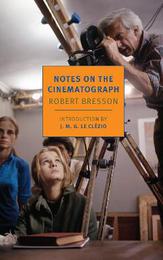
|
Notes On The Cinematograph
Paperback / softback
Main Details
| Title |
Notes On The Cinematograph
|
| Authors and Contributors |
By (author) Jonathan Griffin
|
|
By (author) Robert Bresson
|
| Physical Properties |
| Format:Paperback / softback | | Pages:128 | | Dimensions(mm): Height 202,Width 127 |
|
| ISBN/Barcode |
9781681370248
|
| Classifications | Dewey:791.43 |
|---|
| Audience | |
|---|
| Edition |
Main
|
|
Publishing Details |
| Publisher |
The New York Review of Books, Inc
|
| Imprint |
The New York Review of Books, Inc
|
| Publication Date |
15 November 2016 |
| Publication Country |
United States
|
Description
A key influence on the French New Wave and the director of such iconic works as Pickpocket and A Man Escaped, Robert Bresson is one of the central figures of French cinema. Notes on the Cinematograph is not only his definitive treatise on film - its inherent peculiarity and potential - but an ascetic meditation on how art transcends, and is transformed by, the senses. Bresson upends inherited truths with empirical ones, calling for film to divest itself of the trappings of theater in order to come into its own as an art form. While theater is capable of simulation, film can capture immanent being. Therefore, the two forms are innately at odds, he argues: "No marriage of theater and cinematography without both being exterminated." To this end, Bresson rechristens his actors "models" and conducts them through grueling shoots where they repeat their lines and movements until he deems them vacant of actorly intention and charged, instead, with inscrutability: "A model. Enclosed in his mysterious appearance. He has brought home to him all of him that was outside. He is there, behind that forehead, those cheeks."
Author Biography
Robert Bresson (1901-1999) was a renowned French film director, whose work was characterized by his minimalist style and interest in actor (or "character") movement. Bresson directed thirteen films over forty years, including Au hasard Balthazar (1966), which is considered his masterpiece. Jonathan Griffin (1906-1990) was a translator, poet, and diplomat, who served as Director of BBC European Intelligence during World War Two. In addition to translating works by Robert Bresson, he translated Jean Giono novels, General de Gaulle's memoirs, and art criticism by Rene Huyghe. A collection of Griffin's poetry, In Earthlight, was published in 1995 by Menard Press.
Reviews"The collection Bresson on Bresson: Interviews 1943-1983 and Bresson's own Notes on the Cinematograph are primers for the gradual understanding of Robert Bresson, to paraphrase Gertrude Stein...Notes on the Cinematograph is the ultimate refinement of Bresson's thought, a loosely grouped succession of aphorisms and Zen koans." -J. Hoberman, The New York Times "If there were any director you might expect to write what is, in effect, a philosophical notebook on the art and science of film-making, it would be Bresson...This is...a collection that reaches beyond its subject matter. It actually is philosophy." -Nicholas Lezard, The Guardian "Half-philosophy, half-poetry, Notes on the Cinema to graph reads in places like The Art of War for filmmakers." -John Semley, The A.V. Club "The power of Bresson's films lies in the fact that his purity and fastidiousness are at the same time an idea about life, about what Cocteau called 'inner style,' about the most serious way of being human." -Susan Sontag "Short, aphoristic fragments that guide Bresson's film making. Scribbed down as 'notes to self,' reading them in whole is astonishing & inspiring, a totality of a brilliant filmmaker." --Mike Kitchell, HTMLGiant Notes on the Cinematograph...feels like the rare beast: a manifesto of filmmaking one doesn't see much of nowadays. In it, Bresson's artistic philosophy is laid bare. -Zak Salih, The Los Angeles Review of Books An original and singular figure, Breton sought a truer form of narrative film...a welcome creative tool, both for people interested in making art and for those who just enjoy talking or thinking about it. -Ignatiy Vishnevetsky, A.V. Club Bresson's films are many things. They are among the most maddeningly beautiful in all of cinema; each is like a wedge violently driven into the world. Bresson's cinema is a monument to an idea of art that knows no compromise. -Michael Blum, The Brooklyn Rail
|